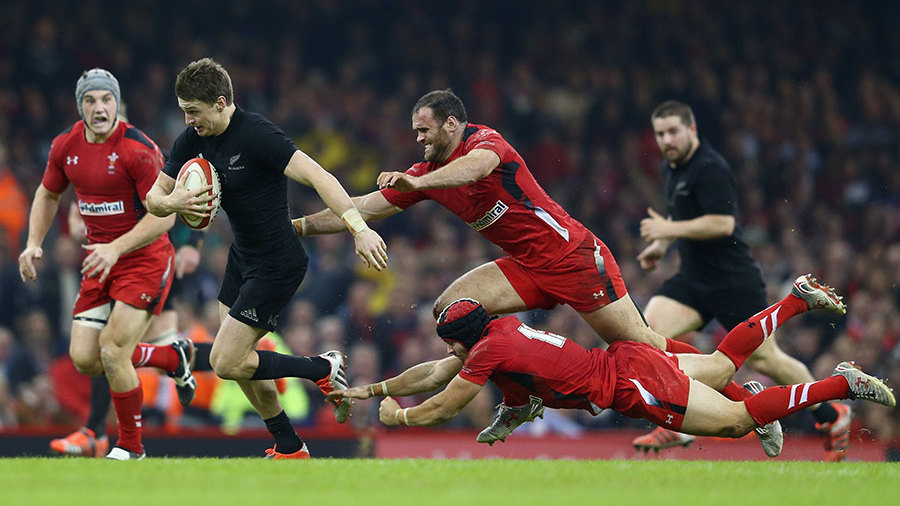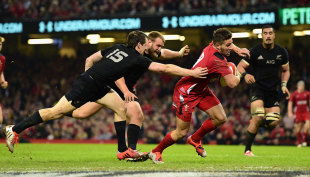|
Wales 16-34 New Zealand
Wales closer than ever yet as far away as before
Huw Richards
November 22, 2014

Beauden Barrett leaves Jamie Roberts and Leigh Halfpenny grasping thin air in Cardiff © Getty Images
Enlarge
Where there is no prior expectation, disappointment should not be possible. That, at least is the theory. Reality proved very different on a day when Wales allowed their fans to hope for more than an hour. There should be no complaint about the final outcome. Matches, as Steve Hansen rightly pointed out, last for 80 minutes and points scored at the end count for just as much as those recorded at any other time. But for the first time in more than a quarter of a century attending this fixture, it was really possible to believe that Wales might win. There have been matches which finished with Wales closer - the single-point margin in 2004 and the day on which Alun Wyn Jones was unable to run in an interception which would have brought a draw. But a draw is all that would have been - and in 2004 an injury-time try made it look closer than it really was. This time Wales felt as close as they have done since the match of Andy Haden's notorious line-out leap and Bruce McKechnie's heart-breaking last-gasp penalty in 1978. When Leigh Halfpenny kicked Wales into the lead for the third time with 13 minutes to go, all seemed possible. The All Blacks, as Twickenham in 2012 and the near-miss in Dublin last year showed, are at their most vulnerable in the last match of the season when minds invariably half-turn towards the flight home.
They had looked some way short of the standard they set a fortnight ago at Twickenham. When a player as usually precise and composed as Conrad Smith kicks full to touch, all is not well. And they were out of sorts not least because Wales had harassed them into error after error. Beauden Barrett had struggled at outside-half, missing a highly kickable penalty and seeing a succession of chip kicks going astray. As Warren Gatland said: "There were periods today when we rattled them, and there were moments when they were rattled in the last 15 minutes." For Wales, Jamie Roberts had the sort of game we usually only see for him south of the equator, a giant in a defence which made the All Blacks look human for long periods who drove forward forcefully and purposefully when he had the ball in hand. Rhys Webb was a force of nature at scrum-half, his try a richly deserved reward for his efforts, while the back row competed effectively at the breakdown. And yet, and yet…. That Webb was forced off injured - Gatland explained that he had 'a bit of a groin' - certainly did not help and there was a hint of ill-luck for Wales in the crucial try, as the bounce confounded Leigh Halfpenny. But given what happened last time Wales beat New Zealand, there can hardly be complaints about the occasional lucky bounce the other way. Barrett had the self-belief to go on chipping ahead, and the skill, handling and composure needed to make it finally come off.

Rhys Webb's try was no more than his all-round play deserved
© Getty Images
Enlarge
But there are more fundamental issues for Warren Gatland and his coaching team to confront. Wales struggled at both scrum - particularly in the first half where they conceded a series of penalties - and line-out. Six line-outs were lost on their own throw - and when that happens you'll struggle to beat Italy on a bad day, never mind the All Blacks. As Gatland said: "The line-out had gone well in the last couple of matches. They put us under pressure, and sometimes that happens in these big games." Fair enough, but this was not an isolated incident. It is hard to remember a time when Wales were not fallible at the line-out, and chronically prone to blow the big opportunities close to the opposition line. That failure at the set-pieces meant there was no platform on which Wales could construct a path to victory in those fraught final minutes. Never mind this defeat - compare and contrast the ability of Ireland to hold on under intense pressure against Australia with Wales' series of failures against the same opposition. It was also a fundamental factor in that final collapse. To chase the game, you need continuity. The All Blacks, executing with characteristic precision, picked them off to make the final margin - and in particular the tally of five tries to one - far more decisive than had seemed likely during the first 70 minutes. Gatland is almost certainly also correct when he says, drawing on his own memories of Waikato's struggles with the scarily good Auckland teams of the early 1990s, that "the first one is the toughest. Once you do that, it gets easier afterwards". But after six years of defeats against the southern giants, Wales are still waiting for that first one. And the waiting gets no easier when hope is raised like this, then dashed as so often before. © ESPN Sports Media Ltd
| ||||||||||||||||||||||||||
Live Sports
Communication error please reload the page.
-
Football
-
Cricket
-
Rugby
-
- Days
- Hrs
- Mins
- Secs
F1 - Abu Dhabi GP
Abu Dhabi Grand Prix December 11-131. Max Verstappen ()
2. Valtteri Bottas (Mercedes)
3. Lewis Hamilton (Mercedes)
4. Alexander Albon ()
5. Lando Norris ()
6. Carlos Sainz Jr ()
-
ESPNOtherLive >>
Golf - Houston Open
Snooker - China Open
Tennis - Miami Open

